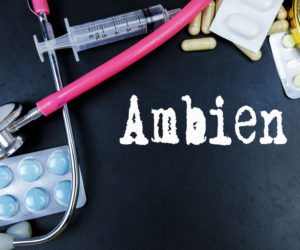Ambien Side Effects

9 Dangerous Ambien Side Effects
Ambien is the trade name for zolpidem, a sedative medication commonly used to treat insomnia. However, even when used exactly as prescribed there are a number of Ambien side effects that could affect the user.
Some of the more common Ambien side effects include:
- Dizziness or lightheadedness
- Dry mouth or throat
- Constipation
- Impaired thinking and confusion
- Slowed reaction times
- Short-term memory loss
- Daytime fatigue and drowsiness
The milder side effects caused by the drug may stop once usage of the medication stops. However, there are also some Ambien side effects that can be dangerous and even deadly. The danger increases if you’re using Ambien for non-medical purposes or taking the medication in any way other than what the doctor prescribed.
Ambien Side Effects
While Ambien can be highly effective when taken under medically controlled conditions, it also has the capacity to produce some dangerous side effects. Here are nine of the more dangerous Ambien side effects to watch for:
Sleepwalking: Some people taking Ambien may experience episodes of sleepwalking, where they are technically still asleep but will get out of bed and walk around. There are reports of people acting out normal daily tasks while sleepwalking under the influence of Ambien, including driving a vehicle. The person is in danger of harming themselves or others while in this state, especially since they have no memory of any of their actions.
Shallow or Slowed Breathing: Ambien slows the breathing rate, reducing the amount of oxygen that gets to the brain and around the body. If breathing slows too far it can result in death.
Loss of Consciousness: While zolpidem is designed to help people sleep, taking too much could result in losing consciousness completely.
Coma: When the central nervous system slows down too far, it can induce a coma.
Tolerance: Tolerance to zolpidem can develop relatively quickly. The user may feel the need to take higher doses in order to achieve the same effects, which increases the risk of overdose.
Addiction: Taking zolpidem over an extended period of time can cause physical and psychological dependency or addiction.
Withdrawal symptoms: If a person who has been taking Ambien for an extended period of time tries to stop taking the drug abruptly, a range of physical and psychological withdrawal symptoms may emerge. Some of the symptoms of Ambien withdrawal can be fatal and include coma or seizures.
Overdose: It is possible to overdose on Ambien, which is why it’s crucial to follow a doctor’s prescription carefully. The Substance Abuse and Mental Health Services Administration (SAMHSA) reported a 220% increase in emergency cases related to Ambien overdose in the five years leading up to 2010 (1). The risk of overdose is dramatically increased if the medication is combined with alcohol, opiates, or other sedative drugs.
Death: While overdose fatalities caused by Ambien alone are rare, the mortality rate increases dramatically when the medication is combined with other drugs or alcohol.
Dangers of Ambien and Alcohol Combined
Ambien is a strong sedative medication that acts directly on the central nervous system. Likewise, alcohol also acts as a sedative on the central nervous system.
Combining Ambien with alcohol can increase the risk of experiencing some of the more threatening side effects. The combination of both sedatives also significantly increases the dangers of Ambien and alcohol overdose.
Symptoms of a combination Ambien and alcohol overdose include respiratory depression (slowed breathing rate), slowed heartbeat, severe confusion, excessive sedation, severe confusion, loss of consciousness and coma.
Withdrawing from Ambien Safely
If you or someone you know has developed a dependency on zolpidem, it’s important that you don’t try to quit using the drug by going ‘cold turkey’. Stopping use of a sedative medication after extended use can cause a series of potentially dangerous withdrawal symptoms.
The safest way to avoid the dangers of Ambien withdrawal symptoms is to seek help from a drug rehab treatment facility. Medically-assisted detox programs can help you taper off Ambien slowly under medical supervision, which reduces the severity of any withdrawal symptoms and ensures your safety throughout the detox process.
Rehab treatment programs can also combine the right therapies and treatments to begin addressing some of the underlying psychological triggers behind self-destructive behaviors associated with Ambien abuse.
If you or a loved one needs help with abuse and/or treatment, please call the WhiteSands Treatment at (877) 855-3470. Our addiction specialists can assess your recovery needs and help you get the addiction treatment that provides the best chance for your long-term recovery.

